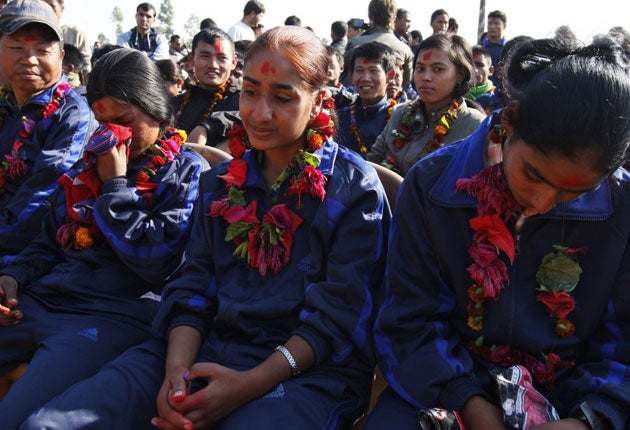Former child soldiers leave Nepal camps

After a final meal of chicken, beans and rice, and wiping tears from their eyes, more than 200 former Maoist child soldiers were yesterday released from the jungle camps in Nepal where they have spent the last four years to start new lives in their villages.
In what marked the beginning of a long-awaited process to rehabilitate up to 4,000 former child soldiers, the first group left the camps wearing garlands of marigolds but carrying too a mixture of sadness and optimism.
“I am very sad to leave other colleagues with whom we stayed for so long,” 22-year-old Laxmi Gautam, who joined the Maoists five years ago, told reporters as a convoy of buses left one camp at Dudhauli, 60 miles south of Kathmandu.
Since a 2006 ceasefire that saw the Maoist rebels lay down their arms and rejoin the mainstream political process in a move that ended a decade-long civil war, around 23,000 former fighters have been living in camps, monitored by the UN.
The Maoists demand that the adult soldiers be integrated into Nepal’s army, though there has been resistance to that.
But in a deal to try and move forward some reconciliation, it was agreed that former child soldiers living in the camps – many of whom were forcibly recruited to the cause - be rehabilitated and returned to their homes. Each of them is to be given some money, schooling and vocational training in subjects such as carpentry and health work.
For all the optimism on display yesterday, analysts say the process of rehabilitation will not be easy. “The major challenges to their rehabilitation still lie ahead. In particular, these young people are often vulnerable to recruitment from numerous illegal armed political groups which still operate across the southern Terai plains or people traffickers promising lucrative employment either across the border in India or, to a lesser extent, Middle Eastern countries,” said Oliver Housden, a researcher at the Royal United Services Institute in London.
“Livelihood or education programmes designed for returnees will therefore have to counter these destabilising forces in order to create a more conducive environment to facilitate a successful return.”
The peace deal that ended a bitter and bloody war also led to the scrapping of Nepal’s ancient Hindu monarchy – something that had been demanded by the Maoists as their price for re-entering the political process. To the surprise of many, it was the Maoists who emerged as the largest party from elections held in April 2008 and their leader Pushpa Kamal Dahal - known by his nom de guerre Prachanda - was subsequently elected as the first prime minister of the new republic.
However Prachanda resigned from the position last year amid a row with the country’s army chief, partly over the integration of the former fighters. When the premier sacked the recalcitrant officer, General Rookmangud Katawal, he was subsequently reinstated by the country’s president who was then accused by Prachanda of trying to make a power grab. Prachanda then decided to resign, throwing the country into fresh turmoil.
Speaking last night from near one of the camps from where the former child soldiers were released , Gillian Mellsop, the Nepal representative for Unicef, said what now happened to the remaining former Maoist fighters was a key issue.
“Conversations are being held between the Maoists and the government,” she said.
“One idea is that former fighters from [minority groups] that are under-represented in the Nepal Army could be the first to be integrated.”
The Maoists had agreed to free the young people last year but the process stalled as they argued with political rivals on how to rehabilitate them.
The Maoists say the discharge underlines their commitment to peace, but have also alleged that the government has so far failed to rehabilitate the former fighters and that young people were returning to their villages empty-handed.
Bishnu Raj Upreti, who teaches conflict management at Kathmandu University, told Reuters: “Since the government is letting them go from the camps without any concrete assurances for their future, they could engage in any coercive activities and create new problems.”
Subscribe to Independent Premium to bookmark this article
Want to bookmark your favourite articles and stories to read or reference later? Start your Independent Premium subscription today.

Join our commenting forum
Join thought-provoking conversations, follow other Independent readers and see their replies